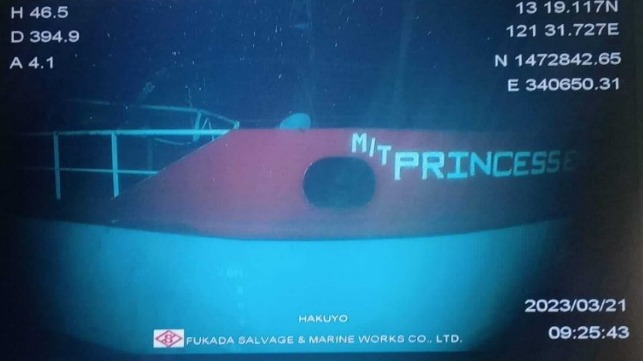Philippines Suspends Tanker Operator’s License as Disaster Aid Arrives

The ongoing dispute between the operator of the sunken tanker that is leaking oil off the coast of Oriental Mindoro and the Philippines’ Maritime Industry Authority (MARINA) intensified with the authority revoking the company’s licenses. This comes as the task force is working on a plan to stop the oil leaks after the vessel was located and the Philippines is receiving yet more international assistance for the disaster.
The small product tanker Princess Empress went down on February 28 with a cargo of 900,000 liters of fuel oil. Since then, the leaking oil has spread endangering critical fishing areas as well as popular tourist destinations. A Japanese salvage vessel using an ROV located the vessel at mid-week and provided the first survey to the extent of the damage and leaks. They are reporting that there are as many as 23 leaking areas. They said all the leaks appear to be coming from the eight tanks with the heavy fuel oil, but they suspect the first leak might have come from the vessel’s fuel supply of marine diesel. That area, however, appears not to be leaking currently.
Oriental Mindoro Governor Humerlito Dolor said during an update that the massive oil spill caused by the Princess Empress has affected 20,932 families. In addition, he said 61 tourism establishments and 750 community-based organizations for tourism and thousands of individuals, are all impacted and would be able to begin filing claims during a “claims caravan” due to start on Monday, March 27.
These reports came as MARINA continues to allege that the vessel did not have the proper permits or was operating with forged documents. On Thursday, March 23, MARINA announced that it issued two cease and desist orders to RDC Reield Marine Services, the company that owns the MT Princess Empress. One was for the cancellation of the company’s Certificate of Public Convenience, while the other was issued to halt three remaining vessels, two other tankers and one passenger vessel, from operating until the investigations are completed.
MARINA, however, denied one of the allegations which have circulated saying that the vessel was not a newbuild but rebuilt from a scrapped vessel. MARINA administrator Hernani Fabia told reporters that based on its records, they believed the vessel was a new construction and that they had advised the National Bureau of Investigation.
The survey by the Japanese ROV showed that the sunken ship has extensive structural damage due to the pressure while sinking, and the front portion is the most heavily damaged part of the ship. Oil leaks were observed from all eight compartments, and some through the ballast tank as well as from the ship’s access hatches, cargo tank pressure valves, and cargo pipework on the ship’s deck, including valves. The No. 4 port pressure valve was reported to have the highest flow rate. Governor Dolor said that among the plans suggested for containing the leaks include bagging, patching the leaks, and hot tapping and pumping.
International help is continuing to arrive in the Philippines to assist with disaster recovery. The United States Ambassador said that they would be providing additional financial support as well as protective equipment, hygiene kits, and oil spill cleaning supplies. The U.S. Coast Guard and National Oceanographic and Atmospheric Administration (NOAA) are already in Oriental Mindoro to help with cleanup and providing satellite imagery and modeling applications to help the Philippine Coast Guard and the University of the Philippines-Marine Sciences Institute estimate the trajectory of the spill.

that matters most
Get the latest maritime news delivered to your inbox daily.
Assistance will be arriving from South Korea next week. A response team from the Korean Coast Guard along with technical experts are due to arrive on March 28. South Korea has also pledged to ship 20 tons of absorbent pads, 2,000 sets of protective equipment, and a 1,000-meter spill boom by the first week of April.
The Philippine Coast Guard announced that it has applied to the International Oil Pollution Compensation Funds, run under the auspices of the IMO, for assistance with the clean-up effort and also to P&I London, the insurer of RDC Reield Marine Services, which is already onsite setting up for the claims caravan. The PCG is asking for assistance to help speed up the acquisition of remotely operated vehicles (ROVs).
